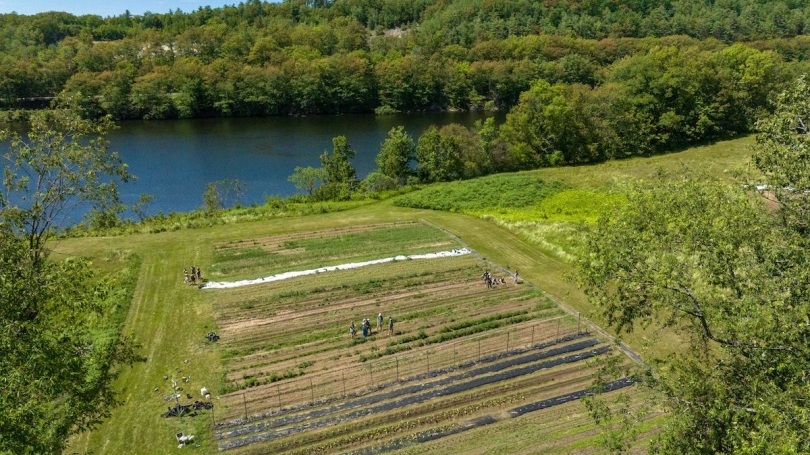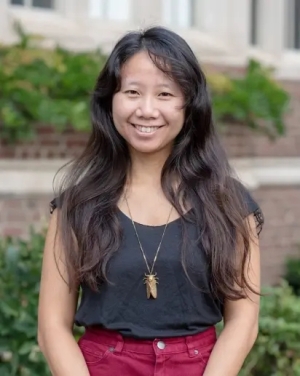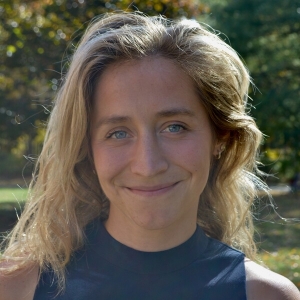

Research and community outreach led by Assistant Professor of Environmental Studies Theresa Ong helps farmers adopt sustainable agricultural practices.
As a biology major in college, Theresa Ong recognized that the study of conservation sometimes disconnects people from nature.
"Research in the lab can separate people from the natural world," says Ong, an assistant professor of environmental studies. "I discovered that food systems were a great place to develop research with direct applications to people, and where we can be part of the solution, rather than just the reason why environmental issues exist."

Food plays a central role in everyone's life, making it a great "vehicle for education," Ong says.
An agroecologist, Ong studies agricultural systems to understand how complex interactions between the environment, organisms, and people influence food production and ecosystem stability. For example, a study she led in 2022 found that urban gardens with rare plants attract unique species of pollinators—including bee and bird species. Human management of gardens and farms can have direct impacts on organisms living in them.
This summer, Ong has been researching the design of agroforestry systems with undergraduate and graduate students at the Organic Farm. Three miles north of the Dartmouth campus, the farm was created by students in 1996, inspired by an environmental studies capstone class project in 1991. Since then, the O Farm has grown into a hub for hands-on and interdisciplinary learning.
"We're interested in how agroforestry systems can help farmers transition to more sustainable practices effectively," Ong says.
The Northeast Agroforestry Transition Hub
Among their many environmental benefits, trees mitigate the effects of flooding and droughts. Forests can soak up excess rainwater and release water in dry seasons.
The Northeast Agroforestry Transition Hub, a project the Ong lab runs with support from the USDA's Sustainable Agriculture Research and Education program, fosters sustainable agroforestry practices in the region. The hub collaborates with groups of farmers who are recruited through local listservs, partners, and outreach.

Kristin Jovanelly, a graduate student in the Ecology, Evolution, Environment, and Society program, coordinates the program.
"Each cohort participates in a series of workshops with local partners, receives site visits and assessments, and engages in farmer-to-farmer networks, including a new public online design and monitoring platform. Through these different interactions, we work with farmers to co-develop ecologically informed agroforestry plans that support their management objectives and promote climate resilience."
Many partner organizations help provide educational programming, including East Hill Tree Farm, the National Agroforestry Center, White River Natural Conservation District, Northeast Forest Farming Coalition, Yellow Bud Tree Farm, White River Partnership, Sterling College, University of New Hampshire, University of Vermont, Dairy Grazing Apprenticeship, Interlace Commons, Hanover Co-Op, and the Environmental Leadership and Training Initiative at the Yale School of the Environment.
In addition to the classes and co-designed plan, farmers receive free, locally adapted trees that the Ong lab grows at the Organic Farm, as well as support in planting.
Since the project kicked off in 2021, the hub has helped 18 farmers across the region build agroforestry plans. An additional 70 people have audited or taken part in various educational programming.
Collaboration with farmers enables the Ong lab to investigate and contribute to a growing body of literature on agricultural adaptations to climate change.
"Farming practices are adopted based on balancing many—often imminent and conflicting—needs with external conditions," Jovanelly says. "Transitioning even a small or marginal portion of their operation to an agroforestry system involves a level of risk and depends on each farmer's independent hierarchy of values and motivations as well as farmers' available capital."
The USDA grant also supports the Ong lab in working with farmers across the region to understand the culture of tree planting, management, and protection in the Upper Valley.
"Through interviews and soil sampling of forested areas on farms, I am exploring how farmers interact with trees to build resilience into their operations," Jovanelly says. "This work investigates the role of trees on farms, and highlights ways that farmers, researchers, foresters, and other stakeholders can work together to bolster forest health and agricultural productivity in an era of global change."
Sustainable agriculture in your garden
Students at the O farm learn how to replicate sustainable agricultural practices in their own gardens and green spaces.
For individuals looking to adopt more sustainable practices in their own gardens, Ong suggests starting with nitrogen-fixing plants like beans, which are hardy and thrive in various soil conditions.
Since organic agriculture prohibits the use of chemical inputs, including pesticides, the O Farm utilizes tarp coverings and cover crops. For weed management in smaller areas, Ong recommends the "lasagna method," which involves alternating layers of cardboard and compost.
As for managing excessive water in this era of extreme weather, Ong offers a simple solution: plant more trees.